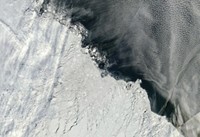Advertisement
Grab your lab coat. Let's get started
Welcome!
Welcome!
Create an account below to get 6 C&EN articles per month, receive newsletters and more - all free.
It seems this is your first time logging in online. Please enter the following information to continue.
As an ACS member you automatically get access to this site. All we need is few more details to create your reading experience.
Not you? Sign in with a different account.
Not you? Sign in with a different account.
ERROR 1
ERROR 1
ERROR 2
ERROR 2
ERROR 2
ERROR 2
ERROR 2
Password and Confirm password must match.
If you have an ACS member number, please enter it here so we can link this account to your membership. (optional)
ERROR 2
ACS values your privacy. By submitting your information, you are gaining access to C&EN and subscribing to our weekly newsletter. We use the information you provide to make your reading experience better, and we will never sell your data to third party members.
Environment
Climate Change Revisited
by Rudy M. Baum
April 21, 2014
| A version of this story appeared in
Volume 92, Issue 16
“The effects of climate change are already evident at Defense Department installations in the U.S. and overseas, and DOD expects climate change to challenge its ability to fulfill its mission in the future, according to the first DOD Climate Change Adaptation Roadmap.” (American Forces Press Service, Nov. 26, 2013)
“Since the start of the 20th century, average annual temperatures across the contiguous U.S. have increased approximately 1.5°F (0.8°C). Recent weather conditions are no exception to this trend. July 2012 was the hottest month in the U.S. since record keeping began in 1895, and 2012 was the warmest year overall, marked by historic high temperatures and droughts, above average wildfires, multiple intense storms that disrupted power to millions, and multiple extreme heat waves.” (“U.S. Energy Sector Vulnerabilities to Climate Change and Extreme Weather,” Department of Energy, July 2013)
“The world’s climate is changing. An increase in the severity and frequency of extreme weather is impacting daily life for the global community. Mounting evidence from the scientific community makes it increasingly clear that climate change is having a significant effect on the world’s social and economic risks. The scientific evidence also strongly indicates that human behavior contributes to global warming.” (“Climate Change Policy,” Reinsurance Association of America, Feb. 22, 2013)
In a News of the Week story in this week’s issue, C&EN Senior Correspondent Cheryl Hogue reports on the latest Intergovernmental Panel on Climate Change (IPCC) report on mitigating climate change (see page 6). Holding global warming to the internationally agreed-upon limit of 2 °C is still possible, according to the IPCC report, but it will require large-scale technological shifts, and they have to start occurring now.
Although IPCC reports draw on the expertise of hundreds of distinguished climate scientists from around the world, climate-change deniers will tell you that IPCC is made up of a bunch of scaremongers who are bent on presenting an alarmist view of climate change. That’s why I chose the above quotes. Folks at the Defense Department are generally regarded as pretty practical; same thing over at Energy. And reinsurers? Well, they care about risk and costs and the bottom line.
My point is, those responsible for defending the U.S., for providing the nation with adequate energy supplies, and for insuring insurance companies all think climate change is real.
So what are the climate-change deniers saying these days? If anything, they’re doubling down on their ridiculous claims. The Nongovernmental International Panel on Climate Change (NIPCC)—because, you know, you can’t trust your government—recently published its latest screeds, “Climate Change Reconsidered II: Physical Science” and “Climate Change Reconsidered II: Biological Impacts.”
I know I shouldn’t, but I take these things seriously because they’re designed to deceive, and as a journalist, willful deception annoys me. So what is NIPCC saying? “Neither the rate nor the magnitude of the reported late twentieth century surface warming lay outside the range of normal natural variability, nor were they in any way unusual compared to earlier episodes in Earth’s climatic history.” That’s just not true, according to both IPCC and DOE.
When it comes to biology, though, the deniers wax positively rhapsodic. “The ongoing rise in the air’s CO2 content is causing a great greening of the Earth,” according to NIPCC. That’s utter nonsense. Yes, increased CO2 can stimulate some plant growth (most impressively, in weeds), but other impacts of climate change on plants are strongly negative.
NIPCC also claims that “there is little or no risk of increasing food insecurity due to global warming or rising atmospheric CO2 levels.” And, “Rising temperatures and atmospheric CO2 levels do not pose a significant threat to aquatic life.”
Deniers take each claim IPCC makes about climate change and maintain that the opposite is true. They also deny human-induced climate change is happening. Then they make the assertion that, even if climate is changing, you’re going to love it.
Thanks for reading.
Views expressed on this page are those of the author and not necessarily those of ACS.



Join the conversation
Contact the reporter
Submit a Letter to the Editor for publication
Engage with us on Twitter